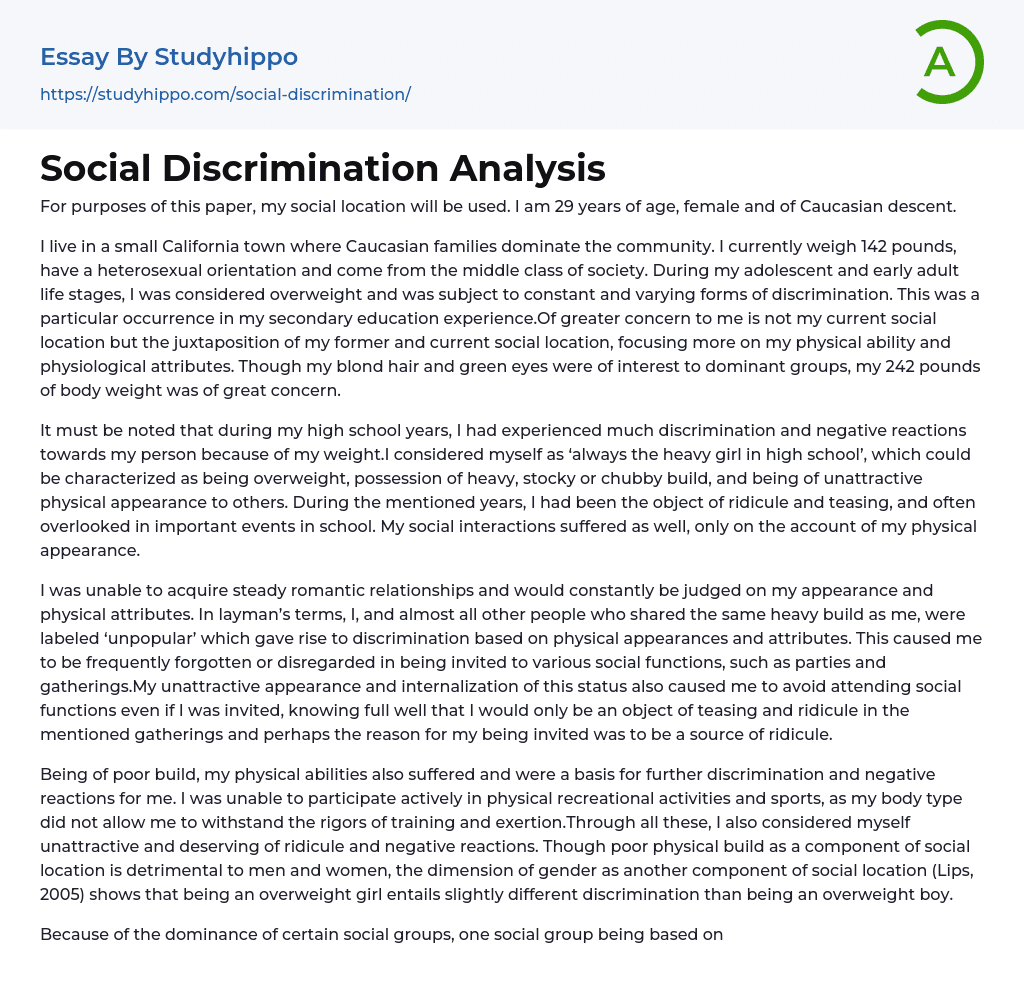In this paper, I will use my social location which includes being a 29-year-old female of Caucasian descent.
Residing in a petite California town, the Caucasian families hold sway over the community. I am categorized as middle-class, with a heterosexual orientation and currently weighing in at 142 pounds. My early stages of life manifested as an overweight individual, subsequently subjected to diverse forms of discrimination, prominently during my secondary education. The most concerning aspect to me is the contrast between my present and past social status, stressing more on my physical capabilities and organic traits. My blonde hair and green eyes grabbed the interest of the dominant groups while my 242-pound body weight caused significant distress.
It should be noted that in high school, I faced discrimination and negativity due to my weight. I saw myself as the overweight girl wi
...th a heavy or chubby build and unattractive physical appearance. I frequently experienced ridicule, teasing, and exclusion from important events, which greatly impacted my social interactions. Unfortunately, my physical appearance was the sole reason for this treatment.
Due to my physical attributes, including my heavy build, I faced discrimination and was labeled 'unpopular'. This resulted in a lack of steady romantic relationships and exclusion from social functions. I often felt judged and forgotten, and felt that attending gatherings would only lead to teasing and ridicule. As a result, I avoided social events even if invited, fearing that I would be the subject of mockery.
As I had a frail physique, I faced discrimination and negative feedback. Additionally, my physical limitations didn't allow me to actively participate in sports and recreational activities. This made me believe that
was unappealing and deserving of mockery. While a weak physical build disadvantage both genders, as stated by Lips (2005), being an overweight girl results in distinct discrimination in comparison to overweight boys.
Due to the domination of certain social groups, including those based on physical appearance, I experienced limitations in terms of peers, products, and privileges in society as a result of the dominant female group's emphasis on physical attractiveness. My size prevented me from wearing appropriate attire and obtaining certain elevated statuses associated with beauty. Unlike overweight males, overweight females faced discrimination from both males and females, which suggests that I may have been regarded as deviant due to my deviation from the norm regarding physical attributes. However, at 29 years old, I have lost 100 pounds and am now considered slimmer and more physically attractive, no longer subject to ridicule and discrimination.
As a physically attractive person, I experience a wider and more frequent range of social interactions and romantic relationships. People often desire a connection with me due to my physical appearance. Moreover, conforming to the norm of physical attractiveness grants me privileges that were previously inaccessible, such as acceptance at social functions and access to various products. This conformity also dissociates me from any association with deviant behavior. Such experiences illustrate the socially-constructed and perpetuated components of social location through dominant societal institutions, as posited by Mills' concept of sociological imagination (Anderson ; Herr, 2007).
The impact of social location is greatly emphasized in how society treats individuals based on physical ability and attributes such as beauty. Discrimination and negative treatment can be experienced by those who occupy certain social locations. Dominant
groups within social institutions assign roles and statuses that dictate how individuals are perceived and treated based on their social location. The concept of sociological imagination is evident in this scenario as beauty is a socially constructed idea encouraged and reinforced by various institutions. Personal experiences including discrimination, limited privileges, and social drawbacks may be attributed to the status society places on physical appearance rather than the appearance itself. Social institutions classify certain physical appearances as deviant and undesirable, leading individuals to adopt similar negative views on their own appearance in order to conform to societal norms.
Although I believed that my appearance and physical abilities were a result of my own conformity to societal norms, these norms are actually created by social institutions. Therefore, while I may struggle with my weight personally, it can be argued that this struggle is not just individual but also sociological. During high school, I mistakenly blamed myself and my body for being unattractive instead of recognizing the societal labels placed on me.
- Ageism essays
- Cultural Diversity essays
- Discrimination essays
- Diversity essays
- Gender Discrimination essays
- Multiculturalism essays
- Oppression essays
- Peer Pressure essays
- Racial Profiling essays
- Sexism essays
- Anthropology essays
- Audience essays
- Charity essays
- Cultural Competence essays
- Emile Durkheim essays
- Gender Roles essays
- Generation essays
- Globalization essays
- Interpersonal Relationship essays
- People essays
- Race essays
- Social Change essays
- Social Class essays
- Social Movement essays
- Social Science essays
- Social Status essays
- Social Stratification essays
- Society essays
- Sociological Imagination essays
- Sociological Perspective essays
- Sociological Theories essays
- Stereotypes essays
- Web Dubois essays




